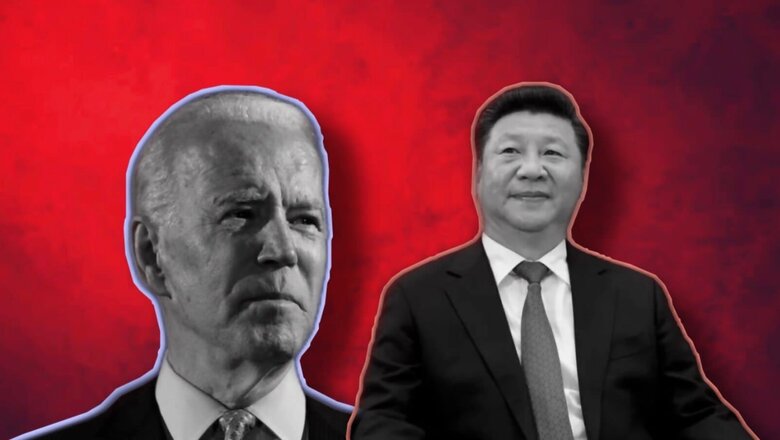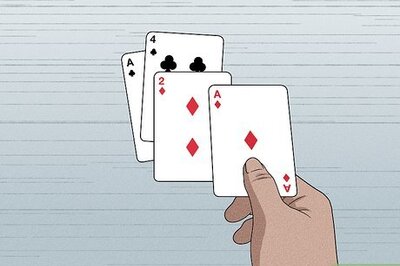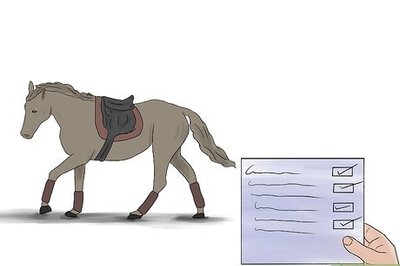
views
Amid historic inflation rates in the United States and tanking approval ratings, US President Joe Biden is considering speaking to China’s Xi Jinping and removing some of the tariffs on Chinese goods imposed by the Trump administration in 2018 when the former president launched an unprecedented trade war against China. Such a move, however, may come with tremendous risks for the American economy and a near-certain political dent in the President’s already troubled legacy.
Despite all the simplistic chatter on how rolling back tariffs on China will ease the burden on the average American consumer and hence will eventually emerge as a popular measure, the risks far outweigh the gains, if any, as the move would encourage American companies to operate in China at the cost of American jobs, and symbolise a desperate American retreat in the face of a hostile economic relationship with China, while vindicating Beijing’s actions in recent years including not sticking to the terms of the Trump-era trade deal.
In fact, China is well aware of the inflationary pressures ailing the Biden administration and believes that this may be the perfect time to squeeze out concessions from the US which is reeling under an inflation rate of 8.6% reported in May, the highest in 40 years. The United States is in essence planning to restore the pre-Trump status quo and strengthen its biggest enemy, China, while being engaged in the economic isolation of a much smaller economic threat, Russia.
China Revels in Victory and Opportunity
Meanwhile, for China, Joe Biden’s desperation is good news as it brings it an opportunity to leave the US red-faced and settle scores since Trump’s trade war. For Beijing, which was once taken aback, devastated by the tariffs and brought to the negotiating table by the previous US administration, the tables have turned. It now sees the USA’s overtures as “admitting its mistake,” regretting its punitive measures, and begging for help. Chinese propaganda outlet Global Times, a mouthpiece for China’s Communist Party, has made it amply clear that China will not see Biden’s overtures and possible tariff reductions as a gift, and would rather extract more humiliating compromises from the American side as a trade-off. “Washington needs to unconditionally cancel all the additional tariffs,” said Chinese ‘experts’ quoted by GT.
GT also says, “since the US is now the side with heavier pressure, China needs to seize the chance and push the US to correct more of the mistakes it made.” It also adds that the Biden administration needs to do more to bring bilateral ties back on track which is a hint towards extracting redactions in rhetoric starting from matters like Taiwan.
Also Read: Dumping Taiwan, Embracing Jinping: Biden’s Capitulation Before China Marks An Ominous Shift
China, which is not fulfilling the terms of the existing trade deal borne out of Trump’s trade war, is emboldened by the Biden administration’s failure to impose those conditions and its flirtation with the idea of removing the tariffs altogether instead. In the deal, China had committed to purchase an additional $200 billion worth of US exports before the end of 2021. None of those additional exports ever took place, and instead, China, with its retaliatory tariffs, reduced its imports from the US to just 57% of its commitment which is not enough to match levels seen even before the trade war.
The pandemic can only be partially blamed for this as China’s commitment to the deal has always been shaky and requires tough leadership in the White House to turn the screws. But that does not seem to be anywhere close to Biden’s agenda whose administration is divided upon how effective the removal of tariffs would be in the context of rising inflation rates. Most estimates show that there would be minimal relief to the average consumer’s wallet as domestic retailers reap most of the gains.
Also Read: The West Failed Ukraine. It’s a Warning Sign For Taiwan As China Takes Cue From Russia
A comprehensive defeat
What’s more, this would only encourage China to leverage its dominance in the global supply chains with other nations. Not just this, but it would also send a message of American unreliability to the USA’s partners in Asia, including India, Vietnam and others, which have seen businesses flee China and have benefited from this “restructuring” of supply chains to varying degrees. It can also weaken the Quad’s credibility significantly before ASEAN, as its “strongest” member may now become its weakest link. The USA’s commitment to fine-tuning the global supply chains and curbing undue Chinese dominance in the markets is fading in the eyes of international stakeholders and this will add to their apprehensions about getting on board with any US or Quad initiative to restructure global supply chains.
Locally, this could sound the death knell for American manufacturers and torpedo the White House’s claims of increasing American jobs. Joe Biden’s approval rating has plummeted to 39%, an alarming and enduring situation less than two years into his presidency. Yet, he has already arrived at the final and most expensive option to address inflation and the worst part is that the tariff curbs will come at a great strategic and political cost without guaranteeing significant benefits to the public. In other words, Biden’s last option, which is to remove tariffs on China, is a complete dud and would only land him on a minefield of political attacks just ahead of the November 2022 mid-term elections. Therefore, slashing the said tariffs on China would trigger both political and strategic setbacks for the Biden administration and will be more counterproductive than convenient for the US.
Read all the Latest News , Breaking News , watch Top Videos and Live TV here.

















Comments
0 comment